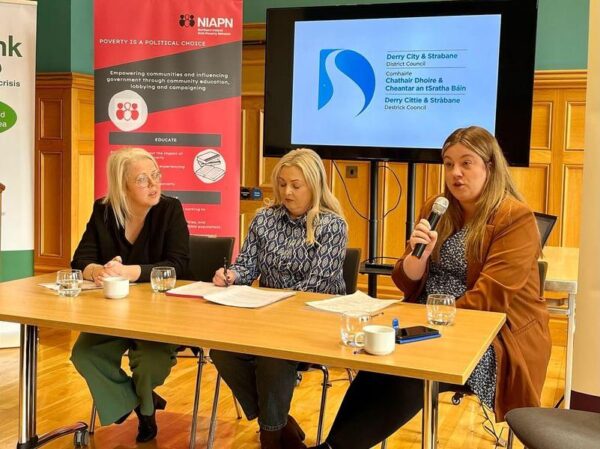 The Northern Ireland Anti-Poverty Network organised a panel discussion ‘Poverty is a Political Choice’ on Tuesday 17 October at the Guildhall for the International Day for the Eradication of Poverty.
The Northern Ireland Anti-Poverty Network organised a panel discussion ‘Poverty is a Political Choice’ on Tuesday 17 October at the Guildhall for the International Day for the Eradication of Poverty.
The first panel focused on ‘Tackling Poverty in Derry and the North West.’ featuring Rayna Downey, Derry Women’s Centre, Karen Mullan, Foyle Foodbank and Amie Gallagher, Focus Project, Creggan Enterprises.
Rayna Downey described the way in which the COVID-19 pandemic, the cost of living crisis, low paid work, lack of a childcare strategy and a benefit system that isn’t fit for purpose has “created the perfect storm where women became the shock absorbers of poverty in their homes”.
She addedd: “They were forced into making tortuous decisions like skipping meals, watering down baby formula, selling their possessions just so that they could provide the essentials needed for their family’s survival.
“Children went to beds with their coats on in freezing homes because there was no money for heat, women ate nothing but leftovers from their children’s plates because there wasn’t enough food to feed them all.”
Rayna Downey highlighted that the Derry women’s centre also supports 63 women from 26 different countries.
Many of these women have ‘no recourse to public funds’ and restrictions on paid work because of their visas. This population is really struggling right now because of poverty.
“These women and children are scared they have relocated their entire lives and some have experienced severe trauma on their journey here, providing them with a safe space, and allowing them to gain skills, establish friendships, and access counselling services is a privilege for us.”
Karen Mullan, Strategic Development Manager of the Foyle Foodbank, warned that this winter will be worse than last, as she and her staff are preparing for more referrals entering the winter months. “The situation is dire.”
She added: “The massive housing gap is a huge problem in Derry. Mortgage payments going up, social housing rents, private rents.
“People do not have enough money from housing allowance to cover their rents.” This is leaving families in a particularly vulnerable situation.
Amie Gallagher, who works on the Focus Project, empowering women in Creggan, called for urgent action. “It is impossible to engage marginalised women into community development and peacebuilding if what we really need to do is make sure women have the basic essentials. We are doing crisis management. And women across this city are in crisis mode.”
Amie continued that we need to engage our representatives and call them out when they are not doing their jobs.
“Poverty can be lonely and stigmatising. There is power in knowing you are not alone. Power in valuing lived experience. We need system change and political overhaul. No one today should be living in poverty.”
Goretti Horgan, social policy lecturer at University of Ulster, and Bernadette McAliskey closed the event with comments on the structural changes we need to see to eradicate poverty.
Goretti Horgan underscored the looming housing crisis with the cut to Discretionary Housing Support Payments. “Housing allowance has been frozen, but rents have increased. Discretionary Housing Support is essential for bridging the gap in rents and is instrumental for keeping people in their homes. It makes no sense for the Department [for Communities] to make this cut, as it will be more expensive for that same department to house people in temporary housing and hostels if they lose their homes.”
Bernadette McAliskey argued that we need to abolish Universal Credit. “It is not the case that it is just mismanaged, but that it is a system that does not reflect the reality of work for people in poverty.
“People living in poverty tend to be in precarious, low-paid work, so they too often have ‘change in circumstances’ which for UC means months with no income.
“There are too many people who are worse off financially when they engage in paid work.”
The event was attended by anti-poverty and community organisations, independent advice and council workers, anti-poverty activists, members of the public, as well as Cllr Shaun Harkin (PBP) and Cllr Aisling Hutton (SF).
NIAPN spokesperson called for immediate implementation of the anti-poverty strategy, but also stressed that we cannot wait for Stormont to return.
“There are immediate steps that can be taken to address poverty.
“Every employer must become a Living Wage employer, especially in the community sector.
“For too long, low wages have thrust more and more people into poverty.
“Secondly, every worker should join a union and become active members of their unions.
“Thirdly, as more and more people are moving over to Universal Credit, everyone who receives a migration letter should seek independent advice because everyone’s financial situation is different.
“And finally, we urgently need mass action to address poverty.
“There is enough wealth in society for no child to go to school hungry, a parent to skip a meal, or a disabled person to ration heat.
“Poverty is a political choice.”
For more information about NIAPN and to get involved with the network: visit www.niapn.org
Tags:




